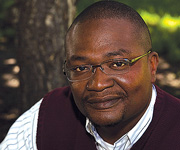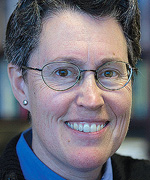Harris School’s Public Policy Student Association core/non-core teaching
By Sarah Galersgaler@uchicago.edu
News Office
 Kerwin Charles |
|
 Paula Worthington |
|
Each year, students at the Harris School of Public Policy Studies select two professors to honor with teaching awards. This year, the Harris School’s Public Policy Student Association has chosen Kerwin Charles, the Steans Family Professor, as Best Professor in a Core Class; and Paula Worthington, Senior Lecturer, as Best Professor in a Non-Core Class.
The son of a biologist and teacher, Charles grew up in Guyana, and always assumed he would be a scientist—until a friend convinced him to take a class on labor economics at the University of Miami.
“It was taught by Phil Robins, whom I have never forgotten,” Charles said. “He was talking about wages and unemployment and unions and the rest. It remains to this day one of my favorite classes ever. I remember toward the end of the class thinking, I don’t want to do anything else.”
Charles, who has been on the Harris School faculty since 2006, works on broad sets of questions in empirical microeconomics, including topics such as wage determination, discrimination, consumption behavior and the economics of marriage.
“[Our students] wish to cure AIDS in Africa or make sure that garbage is better delivered in the Midwest or root out corruption in Indianapolis,” he said. “So, part of my challenge … is to show them over our 10 weeks together, to convince them, of the universal applicability of certain constructs.”
He said he finds it particularly useful to ask students to repeat back, in their own words, something he has just taught them.
“I believe that people fundamentally learn anything only by teaching themselves,” said Charles.
He is also always on the lookout for “the nod,” which students often give when they are trying to mask that they do not understand something.
“Over time, if you develop a rapport with them over the duration of the course, you can tell if the nod is a fake nod, or an authentic nod of comprehension, in which case they can explain what you have taught them in their own language rather than quoting terms back to you.”
Learning is a two-way street for Charles, who says his interactions with students enrich his own research.
“Students ask really great questions. I noticed early on—I was a T.A. in graduate school—that the questions they would ask me would show me that what I had casually taken as axioms and had never engaged with seriously,” he said. “They would say why should that be true? And I would say why indeed?
“Nothing makes you as intimately familiar with the limits of your knowledge as does the effort to construct a teaching plan or a lesson.”
Worthington, an award recipient for the fourth time in five years, specializes in local and state public finance issues such as road construction, school finance and tax policies. She said that her enthusiasm for her job rubs off on her students.
“I am enthusiastic about the material. I care deeply about this material. I have thought about it in different ways for most of my adult life and they pick that up. I’m not bored by it and I think then, by extension, they are not going to be bored by it.
“No one, at age 10, says ‘I can’t wait to be a player and talk about property taxes,’ but my students are very smart and they are here because they are really interested in policy, and they’ve ultimately come to agree that these things matter. And they really want guidance and input on how to think about these things in a careful way, a thoughtful way.”
After graduate school, Worthington spent more than a decade working at the Federal Reserve Banks in New York and Chicago, where she did policy work, writing, briefing memos and presentations. When she realized she wanted a change of pace, she turned to teaching and has never looked back.
Her current classes include Financing State and Local Governments, Cost-Benefit Analysis, and she supervises a practicum program on consulting work for a nonprofit agency or unit of government.
One aspect of the Harris School that Worthington enjoys is that its students end up in policy positions all around the world.
“The footprint potentially is very, very big, and it is exciting to be part of,” she said.
Worthington’s main focus when she prepares for class is to find a way to always engage the students in the material.
“I want them to think there are no bounds. They can understand everything. And they have to be aggressive intellectually and they have to be unafraid to challenge, to think critically. And that is what I try to convey to them through my teaching.”
![[Chronicle]](/images/sidebar_header_oct06.gif)